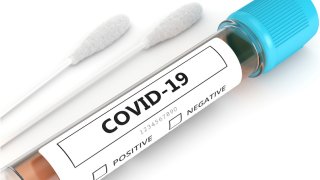
UC San Diego will begin giving COVID-19 tests to the 5,000 students remaining on campus beginning May 11, with successful implementation possibly leading to monthly tests for the 65,000 students, staff and faculty who regularly work and live on the campus as early as September, school officials said.
The "Return to Learn" program will begin with self-administered nasal swabs, and the program team will also look for signs of the coronavirus in residential wastewater and surface collections, a university statement said.
"This effort will leverage the ingenuity and expertise of our clinicians, molecular biologists, epidemiologists, bioinformaticians, and others to work toward a tailored map of where the virus is, and where it isn't," UCSD Chancellor Pradeep K. Khosla said Tuesday. "We expect these efforts to help put us in the best possible position to minimize virus outbreaks and implement new interventions as needed, should we resume in-person activities this fall."
The university is preparing to resume in-person classes once the fall term begins in September.
Once enrolled, a participant will go to one of several designated sites on campus to pick up a nasal swab. Using a downloaded barcode-reader app on a smart phone, the participant will scan the code on the swab's container, linking their cell phone number to the specimen and generating a time stamp.
The participant will then swab the inside of their own nose, drop the swab in the container and leave it in a collection box to be picked up by program coordinators. The swabs will be tested for the novel coronavirus, at the Center for Advanced Laboratory Medicine at UC San Diego Health.
The data collected about the virus are expected to inform an epidemiological model that reflects UC San Diego, its facilities, housing configurations and the way people move and interact around the campus. This knowledge may help university leaders better understand how to most effectively detect cases early, mitigate transmission risk, and guide key decisions regarding housing, class sizes and classroom configurations.
Local
"Our models indicate we need to be able to routinely test a large proportion of the campus community to detect an outbreak at an early stage," said Natasha Martin, associate professor of medicine at UC San Diego School of Medicine. "So it is vital that we start now to understand how to take this program to scale. The initial phase, combined with our tailored models, may deliver data to inform our decision-making about how to expand in-person campus activities in the safest way possible."
Martin, an infectious disease modeler who develops epidemic models to evaluate the impact of public health interventions, is heading the project.
Any participant who tests positive for the illness will be notified and advised to seek medical care. The program's contact tracing team will also try to identify and notify persons with whom the infected person may have had close contact in previous days -- an effort known as exposure notification. In accordance with federal and state regulations, San Diego County public health will be notified about positive cases.
Students experiencing symptoms should call Student Health Services at 858-534-3300. If not a student, but a UC San Diego Health patient, call the dedicated COVID-19 nurse line between 8 a.m. and 5 p.m. at 800-926-8273.
Symptoms of COVID-19 may include a combination of the following: cough, shortness of breath or difficulty breathing, fever, chills, repeated shaking with chills, muscle pain, headache, sore throat, and/or new loss of taste or smell.



